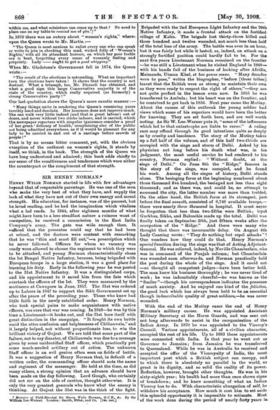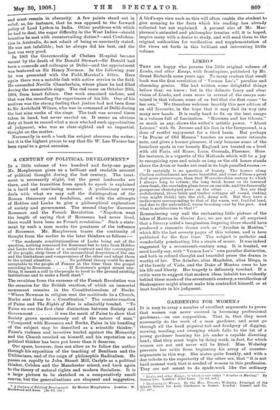SIR HENRY NORMAN.*
HENRY. WELIE NORMAN started in life with few advantages beyond that of respectable parentage. He was oneof the men who ntake the very best of what• they have, and supply the lack. of. what they have not out of their own energy and moral strength. His education, for instance, was of the poorest, but beloved reading, and- he had the imagination which vitalises what a lad reads. In 1844, after eighteen months of what. might have been. to a less steadfast nature a ruinous want of occupation, be received a commission in the East India Company's army. The gate was wide enough then. It suffic.ed that the presentee could say that he had been at school, and the doctors were content with remarking that be was "thin and must fill out,"—a Prescription which he never followed. Officers for whom no vacancy was ready were allowed to choose the regiment to which they were to be attached, and young Norman characteristically chose the let Bengal Native Infantry, because, being brigaded with European troops in a large station, it was a good place for learning his duty. Early in the following year he was posted to the 31st Native Infantry. It was a distinguished corps, and his appointment to it saved him from the fate which otiertook the officers of the 1st. They were massacred by the mutineers at Cawnpore in June, 1857. The 31st was ordered up to Lahore in 1847 to support the Sikh Government set up after the peace of the preceding year. Those who knew had 14tle faith in the newly established order. Henry Norman, who took special pains to make acquaintance with native officers, was sure that war was coining. In 1848—he was by this time a Lieutenant—it broke out, and the 31st bore itself with great distinction in the campaign. " It fought its own battle amid the utter confusion and helplessness of Chilianwala," and it largely helped, not without' proportionate loss, to win the brilliant victory of Guj rat. We are told that some part of the faliure, not to say disaster, of Chilianwala was due to a message given by some unidentified Staff officer, which practically put some much-needed artillery out of action. The unknown Staff officer is an evil genius often seen on fields of battle. It was a suggestion of Henry Norman that, in default of a written order, the commanding officer should note the name and regiment of the messenger. He held at the time, as did many others, a strong opinion that an advance should have been made on the day following. Lord Gough, who certainly did not err on the side of caution, thought otherwise. It is only the very greatest generals who know what the enemy is thinking. At Guj rat the 31st was in the thick of the fight.
I' Memoirs of Field-Harahni Sir Henry Wylie Norman, G.C.B., &c. By Sir WiThato Lee-waraer. London Smith, Elder, and Co. [Ma. net.] - Brigaded with the 2nd European Light Infantry and the 70th Native Infantry, it made a -frontal attack on the fortified village of Kelm. The brigade lost thirty-three killed and_ three hundred and twelve wounded, not much less .than half of the total loss of the array. The battle was over in an. hour,. but it was fairly hot while it lasted, as, indeed, an attack on a strongly fortified Position could hardly fail to be. For the
• five years Lieutenant Nonnan remained on the frontier
—be was still a Lieutenant when he visited England in 1860.-. with his hands full of the business of looking after Afridis, Maimands, Utman Khel, et hoc genus ornne. "Many decades were to pass," writes the biographer, "before [these tribes}, learnt that the British were as strong to maintain their own as they were ready to respect the right of others,"—they are not quite perfect in the lesson even now. In 1855 he was- transferred to Ambala; but his heart was on the frontier, and be contrived to get back in 1856. Next year came the Mutiny. About the causes of this outbreak the young soldier had views which some of his superiors would have been the better- for knowing. They are set forth here, and are well worth noting. As Sir W. Lee-Warner puts it, "some of the influences. which led to that catastrophe are liable to recur." A ruling ,race may offend through its good intentions quite as deeply as by cruelty and insolence. The story of the Mutiny takes .up a full half of the volume, and of this half two-thirds are occupied with the siege and storm of Delhi. Asked by his physician not long before his death what was, in his judgment, the most useful service he had rendered to his country, Norman replied : "Without doubt, at the siege of Delhi." On June 8th the "Ridge," famous in ' the story of the siege, was • occupied, and he found his work. Among all the sieges of history, Delhi stands alone. The besieging force at the beginning numbered. about three thousand five hundred, the besieged not less than eight thousand; and as there was, and could be, no attempt to surround the city, the letter number was more than trebled.. On the other hand, the British force at its strongest, just. before the final assault, consisted of 8,7,48 availa.ble troops,— there were nearly three thousand in hospital. It must. neyer be forgotten that less than two-fifths were British ; loyal Gurkhas, Sikhs, and Baloochis made up the total. Delhi was finally taken on, September 20th, just fifteen weeks after the occupation of the " Ridge." And there were many who thought that there was inexcusable delay. On August 4th Lady Canning wrote : "They. do nothing but repel attacks " ! One wonders how they could do that. Henry Norman's special function during the siege was that of Acting Adjutant- General. He was relieved, indeed, by Neville Chamberlain, who- was in command of the Punjab column; but Chamberlain was wounded soon afterwards, and Norman practically held the post during the whole of the siege. And it could not —so thought all competent judges—have been better held. The man knew his business thoroughly ; he was never tired of work ; he was indomitably cheerful—he was known as the, " Smiler "—though his correspondence indicates the presence of much anxiety. And he enjoyed one kind of the felicitas, the good luck which has always been held to be an essential though indescribable quality of great soldiers,—he was never wounded.
• With the end of the. Mutiny came the end of Henry ;Norman's military career. He was appointed Assistant Military Secretary at the Horse Guards, and was sent out not long afterwards to assist in the reorganisation of the Indian Army. In 1870 be was appointed to the Viceroy's Council. Various appointments, all of a civilian character, occupied the rest of his life. -Up to 1883 these appointments were connected with India. In that year he went out as Governor to Jamaica ; from Jamaica be was transferred to Queensland. While he was in Australia he received and accepted the offer of the Viceroyalty of India, the most important _post which a British subject can occupy, and. to which there is absolutely no parallel in the world, so great is its dignity, and so solid the reality of its power.. Reflection, however, brought other thoughts. He was in his sixty-eighth year ; his health had more than once shown signs of breakdown ; and he knew something of what an Indian Viceroy has to do. With characteristic abnegation of self, he withdrew his acceptance. How much it cost him to set aside this splendid opportunity it is impossible to estimate. Most- of the work done during the period of nearly forty years itu and must remain in obscurity. A few points stand out in relief, as, for instance, that he was opposed to the forward policy of Lord Lytton in India. Other problems with which he had to deal, the sugar difficulty in the West Indies—should bounties be met with countervailing duties P—and Confedera- tion in Australia, do not admit of being so succinctly stated. He was not infallible; but he always did his best, and the best was very good.
In 1901 the Governorship of Chelsea Hospital became vacant by the death of Sir Donald Stewart—Sir Donald had been a comrade and colleague at Delhi—and the appointment was bestowed on Sir Henry Norman. In the following year he was presented with the Field-Marshal's baton. Here again there was a notable link with active service in the field. He succeeded Neville Chamberlain, whose place he had filled during the memorable siege. The end came on October 26th, 1904, from heart failure. One work remained undone, and that was the recording the experiences of his life. One of his motives was the strong feeling that justice had not been done to Sir Archibald Wilson, who was in command at Delhi during the last nine weeks of the siege. The task was several times taken in hand, but never carried on. It seems an obvious duty at least to record what a man who had such opportunities of judgment, who was so clear-sighted and so impartial, thought on the matter.
Necessarily in such a book the subject obscures the writer; but it is the highest praise to say that Sir W. Lee-Warner has been equal to a great occasion.







































 Previous page
Previous page